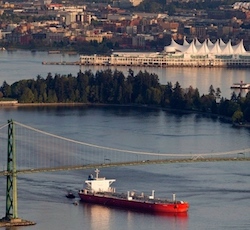Good news and bad news on BC shipping traffic
Ocean, Shipping Comments Off on Good news and bad news on BC shipping trafficBritish Columbia has been a hotspot of concern—and research—about the extent and the impacts of shipping noise. The southern BC coast is close to acoustic saturation, with any increase in noise having the potential to completely overwhelm the underwater soundscape; meanwhile the northern coast holds a few areas that are still nearly free of human noise intrusion, and we need to do all we can to preserve these increasingly rare acoustic refuges. These contentious waters have been roiled in several contradictory though perhaps ultimately productive ways by recent Canadian government actions. In the month between Thanksgiving and Christmas, a northern pipeline was rejected and a southern one approved; meanwhile, ongoing research aims to identify the noisiest ships and help inform new regulations that could reduce overall noise levels.
 The biggest headlines and fears have been spurred by the final approval of the Trans Mountain Pipeline expansion that will deliver oil from the Alberta tar sands to an existing port in Burnaby, BC. The port currently hosts about five tankers a month; the increased flow in the expanded pipeline (75% the capacity as the proposed Keystone XL) will necessitate about 35 ships a month, meaning an average of two tanker transits a day past Vancouver as they travel to and from the Strait of Georgia off the coast. These waters are currently burdened by shipping noise 85% of the time, and the increased traffic will push this to 100% in some areas. Concern centers on the tenuous status of the region’s orca populations, which are struggling to find the salmon they need; shipping noise makes it harder for them to track salmon with their echolocation clicks and to communicate with each other as they search for food. “Death by a thousand cuts, and this is a very deep cut,” says Deborah Giles, research director for the Center for Whale Research. “They’re spending more energy to find less food and we’re adding the equivalent of a rock concert,” she says. “These whales will not survive.”
The biggest headlines and fears have been spurred by the final approval of the Trans Mountain Pipeline expansion that will deliver oil from the Alberta tar sands to an existing port in Burnaby, BC. The port currently hosts about five tankers a month; the increased flow in the expanded pipeline (75% the capacity as the proposed Keystone XL) will necessitate about 35 ships a month, meaning an average of two tanker transits a day past Vancouver as they travel to and from the Strait of Georgia off the coast. These waters are currently burdened by shipping noise 85% of the time, and the increased traffic will push this to 100% in some areas. Concern centers on the tenuous status of the region’s orca populations, which are struggling to find the salmon they need; shipping noise makes it harder for them to track salmon with their echolocation clicks and to communicate with each other as they search for food. “Death by a thousand cuts, and this is a very deep cut,” says Deborah Giles, research director for the Center for Whale Research. “They’re spending more energy to find less food and we’re adding the equivalent of a rock concert,” she says. “These whales will not survive.”
Environmental groups will likely file suit challenging the approval, citing the government’s failure to mitigate the increased impact. At the same time, though, Fisheries Minister Dominic LeBlanc and Transport Minister Marc Garneau are working on a revamped recovery plan for the 80 remaining resident orcas. LeBlanc notes that Read the rest of this entry »
